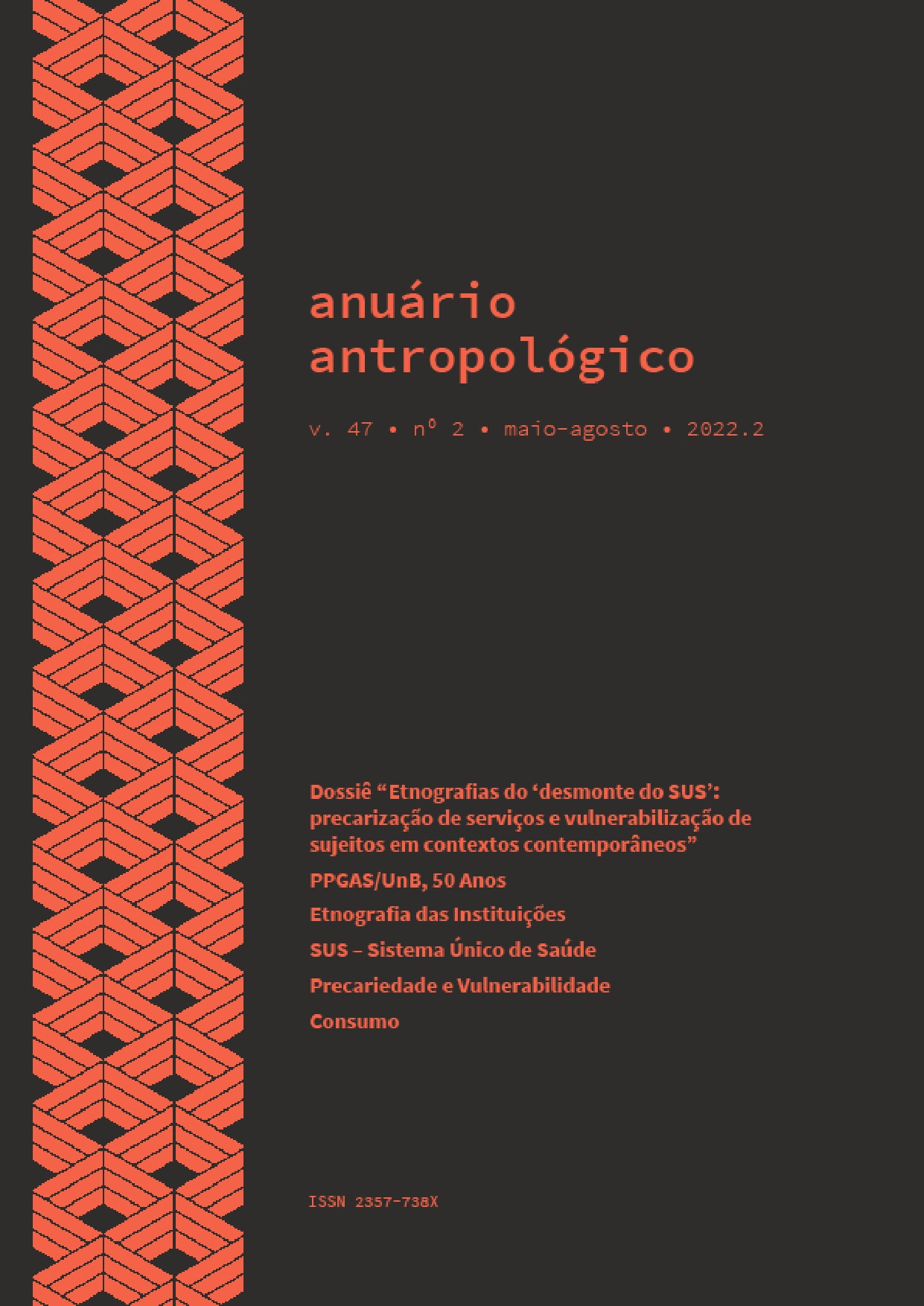The critical normalcy of everyday life in the face of illness and death
DOI:
https://doi.org/10.4000/aa.9720Keywords:
body, death and dying, palliative care, careAbstract
The paper discusses the everyday life of people affected by chronic degenerative diseases from the standpoint of an ethnography in a palliative home care service in the public network of Rio de Janeiro. In the process of dying from illness, daily life is transformed, launching the ill person and their caregivers into the challenge of reconstructing a sense of continuity in life. In order to understand the experience of dying from chronic degenerative diseases, from a specific analytical point of view, I adopt the body as a starting point. Thus, I aim to highlight the connections between the experiential dimension of illness and death, and the discursive and institutional frameworks dedicated to categorizing and managing bodies. I argue that the disturbances, oscillations, and anguish of illness are increasingly incorporated into the “ordinary”, with the decisive mediation of care work. I thus conclude that care work is the main instrument in the delicate task of creating continuity in face of the impending definitive rupture of organic life, whose approach gives rise to many small and large disturbances in everyday life.
Downloads
References
Alonso, Juan Pedro. 2012. “Contornos negociados del ‘buen morir’: la toma de decisiones médicas en el final de la vida”. Interface – Comunicação, Saúde, Educação 16(40): 191–203.
Azevedo, Daniel. 2020. O melhor lugar para morrer. Curitiba: Appris.
Berger, Peter L., e Thomas Luckmann. 1991. The social construction of reality: a treatise in the sociology of knowledge. Reino Unido: Penguin.
Brasil, República Federativa do. Portaria nº 825, de 25 de abril de 2016. Redefine a Atenção Domiciliar no âmbito do Sistema Único de Saúde (SUS) e atualiza as equipes habilitadas. Diário Oficial da União. https://bvsms.saude.gov.br/bvs/saudelegis/gm/2016/prt0825_25 _04_2016.html
Butler, Judith. 2004. Precarious life: the powers of mourning and violence. New York: Verso Books.
Butler, Judith. 2016. Quadros de guerra: quando a vida é passível de luto? Rio de Janeiro: Civilização Brasileira.
Camargo Jr., Kenneth. 2005. “A Biomedicina”. Physis: Revista de Saúde Coletiva 15: 177–201.
Canguilhem, Georges. 2009. O normal e o patológico. Rio de Janeiro: Forense Universitária.
Canguilhem, Georges. 2012. Writings on medicine. New York: Fordham University Press.
Das, Veena. 2007. Life and words: violence and the descent into the ordinary. California: University of California Press.
Das, Veena. 2015. Affliction: health, disease, poverty. New York: Fordham University Press.
Duarte, Luiz Fernando Dias. 1993. “Os nervos e a antropologia médica norte-americana: uma revisão crítica”. Physis: Revista de Saúde Coletiva 3: 43–73.
Duarte, Luiz Fernando Dias. 1998. “Investigação antropológica sobre doença, sofrimento e perturbação: uma introdução”. In Doença, sofrimento, perturbação: perspectivas etnográficas, orgs. Luiz Fernando Dias Duarte, e Ondina Fachel Leal, 9–27. Rio de Janeiro: Fiocruz.
Elias, Norbert. 2001. A solidão dos moribundos, seguido de envelhecer e morrer. Traduzido por Plínio Dentzien. Rio de Janeiro: Zahar.
Fazzioni, Natália Helou. 2018. Nascer e morrer no Complexo do Alemão: políticas de saúde e arranjos de cuidado. Tese de doutorado, Universidade Federal do Rio de Janeiro, Rio de Janeiro.
Fleischer, Soraya, e Mónica Franch. 2015. “Uma dor que não passa: Aportes teórico-metodológicos de uma Antropologia das doenças compridas”. Política & Trabalho 42: 13–28.
Giddens, Anthony. 2002. Modernidade e identidade. Rio de Janeiro: Jorge Zahar Editor.
Kittay, Eve Feder. 1999. Love’s labor: essays on women, equality, and dependency. New York: Routledge.
Menezes, Rachel Aisengart. 2003. “Um modelo para morrer: última etapa na construção social contemporânea da pessoa?”. Campos 3: 103–16.
Menezes, Rachel Aisengart. 2004. Em busca da boa morte. Rio de Janeiro: Garamond Fiocruz.
Menezes, Rachel Aisengart. 2013. “A medicalização da esperança: reflexões em torno da vida, saúde/doença e morte”. Amazônica – Revista de Antropologia 5(2): 478–98.
Nogueira, Carolina de Oliveira. 2016. “Dá licença, posso entrar?”: uma etnografia em uma clínica da família. Tese de doutorado, Universidade Federal do Rio de Janeiro, Museu Nacional, Rio de Janeiro.
Rosenberg, Charles E. 2002. “The tyranny of diagnosis: specific entities and individual experience”. The Milbank Quarterly 80 (2): 237–60.
Seale, Clive. 1998. Constructing death: the sociology of dying and bereavement. London: Cambridge University Press.
Soneghet, Lucas Faial. 2020. “Fazendo o melhor da vida na morte: qualidade de vida, processo de morrer e cuidados paliativos”. Revista M. Estudos sobre a morte, os mortos e o morrer 5(10): 357–82.
Tronto, Joan C. 1993. Moral boundaries: a political argument for an ethic of care. New York: Routledge.
Vianna, Adriana. 2002. Limites da menoridade: tutela, família e autoridade em julgamento. Tese de doutorado, Universidade Federal do Rio de Janeiro, Museu Nacional, Rio de Janeiro.
Downloads
Published
How to Cite
Issue
Section
License
Copyright (c) 2023 Anuário Antropológico

This work is licensed under a Creative Commons Attribution-NonCommercial-NoDerivatives 4.0 International License.

Creative Commons - Atribución-NoComercial-SinDerivadas 4.0 Internacional - CC BY-NC-ND 4.0




